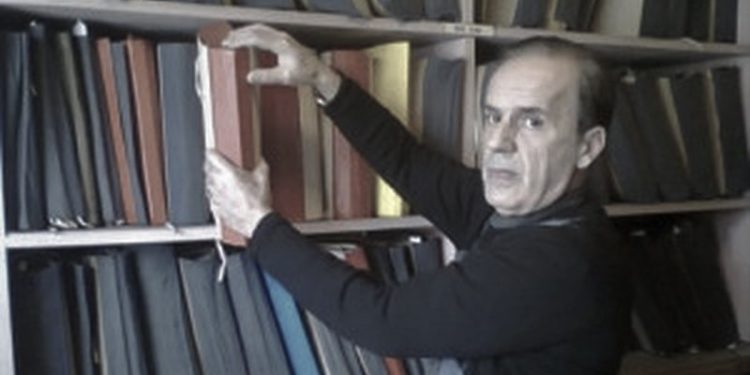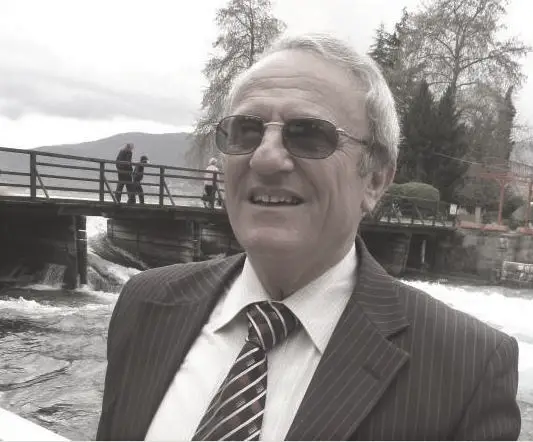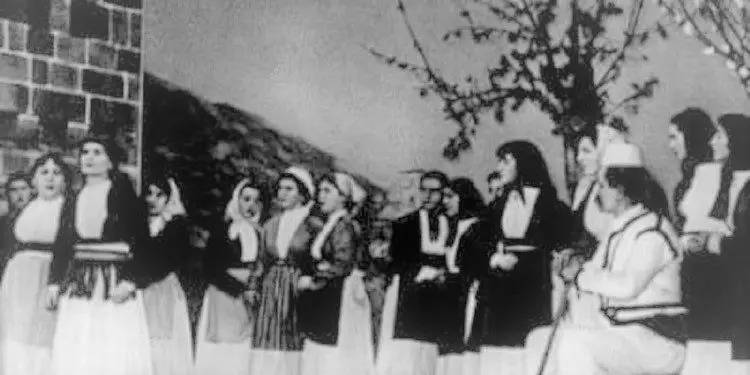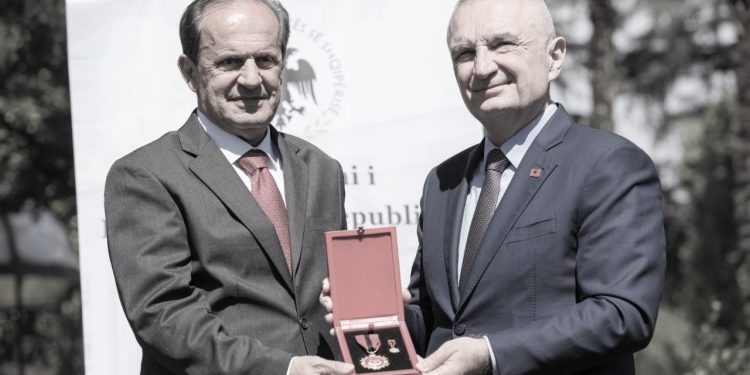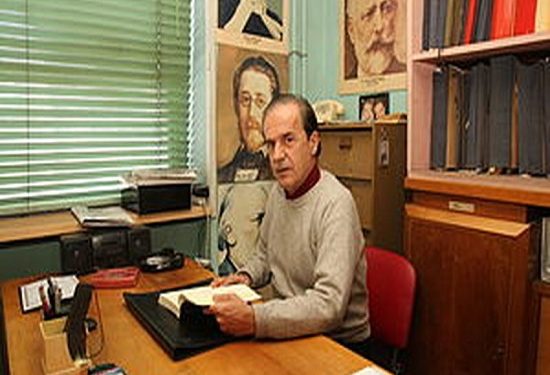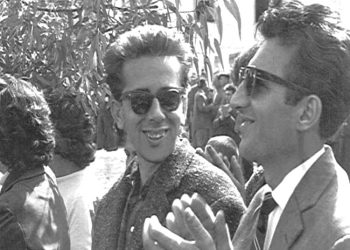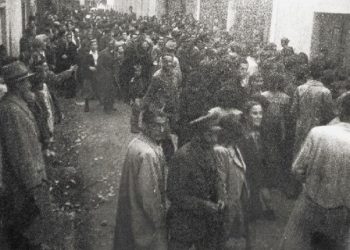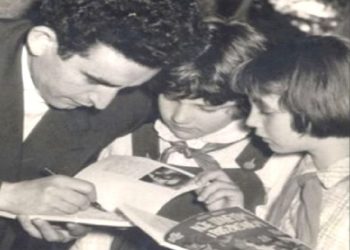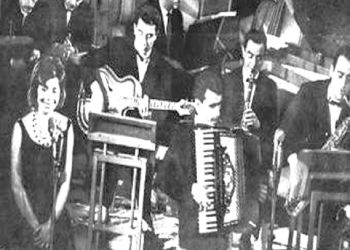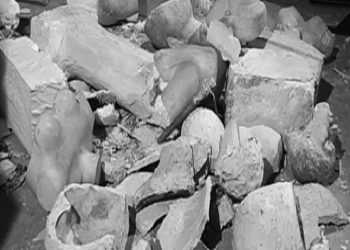From Shpendi Topollaj
Memorie.al / I was very young, when I was amazed by the fluent and eloquent speech of Mrs. Gjylizare Çiço, my teacher at the “Skënderbej” Military High School in Tirana, who, while explaining the mythology, told us that; Orpheus, with the sounds of his lyre given by Apollo and with his sweet voice, calmed the wild animals, even Cerberus himself, the three-headed monster, and also caused the trees to bend and the stones to move from the ground. Then he went on to tell how, with such beautiful melodies, he had managed to make even Hades, the most hated god, miss him, who was forced to allow him to take from the underworld his wife, the nymph Eurydice. I also remembered his severed head that was thrown into the Ebro River, while standing on the waves, it continued to sing.
In that school, among other things, an incredible job was done to instill in us the desire and love for singing. They taught us those line songs, folk songs, light music and rehearsed us in the choir. There, a tradition was fanatically preserved that was created by the tireless master, the ‘Meritist Artist’, Milto Vako. On holidays, well-known singers like: Vaçe Zela, Anida Take, Paulina Nikaj, Qemal Kërtusha, Luiza Papa, Naile Hoxha, etc., and lyrical singers like: Kristaq Paspali, Lluk Kaçaj, Mentor Xhemali, Marie Kraja, Avni Mula, Nina Mula, Stavri Rafaeli, Gaqo Çako, Ramiz Kovaçi, Xhoni Athanas, Hysen Pelingu, etc.
We followed the music programs on the radio with great pleasure, but the highlight was when we went to the Opera organized, in a line, led by the gang, in the middle of the main streets of Tirana. At that time, we learned about them by reading here and there, until two quite attractive books were published: “Masters of musical monuments”, written by Zana Shehu and “When we listen to the opera”, authored by Shaban Vani. With this last book, I also have a story that I will never forget. As an officer who was in a very mundane task, there in a distant ward, apart from the military side, I also attached great importance to what was called mass culture, which included the education and entertainment of young soldiers.
The Commissar of the Corps was the former “Skenderbegasi” Adem Meta, a very cultured and generous man. One day he called all the subordinate commissars to a seminar and mentioned my example, telling them that: “even though he was severely punished by the Party, he still works so well with cultural activities that you should learn from his work”. Someone didn’t like this, and had doubts, which forced Adam to decide on the spot to put them in cars and keep running in our ward. That very day, I had organized a book discussion about operas with the soldiers. After I spoke about its content and values, the soldiers who had been prepared in advance discussed in turn.
This simple activity made quite a good impression on those who were listening, but again, when the conclusions were drawn, a “vigilante”, more zealous than the devil, stood up and said that these things are not enough for our soldiers who , they should first learn the lessons of Comrade Enver. Bobo! I said to myself – I needed this now too. But Adam, with wisdom, took the floor and clarified that he was wrong to think so, that soldiers were people and not robots, they had an inner world, that is, a soul, and they needed music, painting and ballet, for poetry, for theater, for film, and for…! It was not for nothing that it was said that the army was a school. After these words, no one spoke and I somehow calmed down.
I was never separated from opera, as my daughter Eda, after completing her studies at the high school of music “Jan Kukuzeli”, in Durrës, went on to the Academy of Fine Arts for Kanto and today she is a soprano. Once, maestro Zhani Ciko, with his characteristic kindness, called me to the office and asked me to write something for the 85th anniversary of the birth of the famous and unfortunate tenor Stavri Rafaeli.
“I will introduce you – he added – to Zamir Kelliçi, our musicologist, who is in charge of the Archive of the Opera and Ballet Theater and will help you with the materials you need for the article you are going to write.” Talking with Zamir, as I found out that he was a man with a big world and a wide culture, I gave him some of my books. Perhaps spurred on by this, he also got up, took a thick book titled “Operistics” and gave it to me, telling me that it was one of the books he had published. I was happy and promised him that I would read it with great pleasure and even write about it.
One beautiful day in July, I met my friend in Milan. My brother, Spartacus, Consul General of Albania in that country, was so busy with the affairs and troubles of the Albanians, that he did not find the right time to accompany us on the visits we would make to that great city. But being as agile as possible and inexperienced, Leta, his friend, performed this task the best. Of course, I first wanted to see D`uomo with its countless sculptures, Leonardo da Vinci’s famous fresco “The Last Supper” in the church of Santa Maria delle Grazie, where Christ still, as if continuing to say that: ” I know well: one of you will betray me”, and saw La Scala.
When I was in front of the most famous opera in the world, among strong emotions, because I remembered Johannes Kepler’s expression that: “… all the harmonies we encounter in music are found in heaven”, which, Beethoven, had completed by saying that: “There is nothing more beautiful than approaching the divinity and spreading its rays over the human race”. But I was stunned by the pleasure and surprise when I saw that the Italians had shown themselves to be smart, not changing the facade of this building with such a name. She, in front of the magnificent and thought-provoking monument of Leonardo, seems so close and so dear that it cannot be said. Even though I had never been there, again from the movies I had seen or the books I had read, it seemed to me that I was coming to a place with which I was connected with so many events and memories.
And entering it, accompanied by my friend, the talented writer Kujtim Hoxha who has been living in Italy for a long time, I thought of melodies, singers, composers, conductors, painful and happy stories, but I also felt like I was seeing the audience enthusiast who was happy to find a ticket to see the new premiere. As I walked through those corridors, the voices of Caruso in the aria of Bizet’s Nadir and B. Xili in the role of Radames were ringing in my ears, where you say: “Celeste Aida, forma div…”!
A great Albanian also sang here, Tito Skipa from Arbëresh, who, quite rightly, someone has called a member of the “Holy Trinity”. “Sentonel cuore certo dolore”, i.e. “I feel some pain in my heart”. And then Eliot’s lines from The Waste Land, sweetly recited from Memory:
“A woman woke up the long, sleepy black hair
And played sighs of melody on those strings.
I had no choice but to call out as loud as I could: Ave muzicus”!
In conversations with the employees of that opera house, I felt good. The knowledge I had about the history of this genus somewhat surprised them. For my part, I thanked Zamir with all my heart that, by doing such a difficult job with his “Operistika”, he had given me the opportunity to be honored before anyone else.
The glory of operatic music belonged to the Italians. There this genus was born. It was the Florence of the 1600s that had given way to her, with the first performance in the Pitti Palace, with the piece with the meaningful name “Euridika”, to continue with Claudio Monteverdi who then composed “Orpheus” and “Ariana”. The masterpieces of the immortal composers suddenly came to mind: Giacomo Rossini with “The Barber of Seville”, “Otello”, “Laraska Vedhacake”, Vincenzo Bellini, from Catania, with his melodramas, with “Norma”, “The Puritans”, “Somnambula”, “The Capulets and Montes”, Gaetano Donixetti (to whose monument I went in Bergamo) with “Lucia e Lamermur”, “Don Pasquale”, Giuseppe Verdi, with “Nabucco”, “Rigoleto”, “Trovatore”, “Aida”, “Traviata”, “Falstaff”, Giacomo Puccini, with “Bohema”, “Madame Butterfly”, “Tosca”, Ruggero Leoncavalo, with “Paliaçi”, Pietro Maskanji, with “Cavaleria Rusticana”, etc. etc.
But in his book with more than 500 pages, Zamiri, he did not stop only at the Italian opera. He had summarized as a gift on the 55th anniversary of the creation of the National Theater of Opera and Ballet, as he says: “a considerable number of operas and operettas over 400, which includes almost a large part of the operas that make up the golden fund of this genre as democratic as opera is, from the 17th century to the 20th century”.
To line up the history, even briefly, of the entire path that opera has traversed in the world is, of course, quite a laborious task. You have to rummage through books, albums, encyclopedias, archives, newspaper articles of the time, the Internet; you need consultations and verifications, etc. And Zamiri, with several years of patience and dedication, has achieved this. In fact, he was so systematic that he even illustrated the book with tables with the main data on composers, conductors, etc. their works and so on. Further, the reader quenches his curiosity, but also learns the stories of those operas he hears on the radio or sees on television or even on stage. Of course, it is even more beautiful when you know the fate of him or her who sings an aria which, like this, not only penetrates to the depths of the soul, but also makes you join or cry together with him, so participate in the joys and sorrows of heroes.
Opera has the merit of perhaps making you experience more than anything else, what an artistic work seeks to give to the spectator. It is understandable, that it belongs to the elite spectator. But I want to believe that if they follow the operas, those who have read Zamir Kelliçi’s book will surely become passionate amateurs in the future. Çio Çiosani, Toska, Aida, Margerita G., Ludmilla, Kostanca, Julieta, Jilda, Verencki, Lejlaja, Norma, Manon Lesko, Lucia, Nineta, Karmeni, Leonora, Tatiana, Rozina, Arleziane, Izota, Violeta, Amina and many others others, after you have learned their fate and after hearing the magic of the music of the immortal composers, become very present and do not part throughout their lives.
Often they, with their attitudes, both inspire and comfort you and make you love life more and teach you to cope with difficult situations, no matter how dramatic they may be, but also make you think. The voice of famous singers such as Xuzepina Streponi, Xjudita Pasta, Antoneta Pakoni, Çezira Ferrari, Klara Petrelo, Rozina Starkio, Fani Donateli, Hariklea Darkle, Edit Piaf, Mari Kallas and even Tefta Tashko, Gjuzepina Kosturi, Marie Kraja and Inva Mula, they seem very close and dear. Their wonderful arias are not shared all day. This also applies to the main protagonists that I am not mentioning, since most of them are already known to the public who is interested in reading this article.
It is understood that the author of this book probably had a lot of trouble, even when he worked on the part that talks about the development of opera in our country. Its beginnings date back to November 28, 1953 at 5:00 p.m. on the stage of the former People’s Theater (then the “Kosova” Theater), when the premiere of the opera “Rusallka” was given, with books and music by Dargomizhskij (based on the poem by Alexander Pushkin), conductor, the unforgettable Mustafa Krantja, choir master Konstandin Trako and ballet maestro Rusteva and Panajot Kanaçi. There are still some of those first spectators who witnessed this event and who keep in their ears the fascinating sounds of our bel canto singers, such as: Jorgjia Truja, Hysen Pelingu, Zihni Berati, Gjyzepina Kosturi, Maria Kraja, etc.
With the staging of foreign operas or beautifully created by our composers, such as “Mrika” by Prenk Jakovo and continuing with pieces by talented and humane authors such as Tonin Harapi, Tish Daia, Česk Zadeja, Nikola Zoraqi, Pjetër Dungu , Baki Kongoli, Kristo Kono, Kostandin Trako, Vangjo Nova, Kozma Lara, Edmond Mara etc., even though their efforts often went to waste, due to “ideological-artistic” deficiencies, in Albania the school was created with complete success our opera.
Maestro Zhani Ciko’s statement that: “Today, the National Theater of Opera and Ballet, is an institution not only at the top of the obelisk of national culture and art, but also an institution that enjoys the respect and love of the public” that follows and stimulates him. True personalities of the Albanian musical culture have come to life during all the years of existence in his songs”.
After the reconstruction, I want to believe that our artists will, with their talent and dedication, raise this obelisk even higher. Their work is pointed out very kindly by Zamiri, a musicologist who, when talking to him about music, remembers Nietzsche’s assessment that: “Life without music is nothing but a mistake, an exhausting job, an exile…” !
Let us leave in this exile the severed head of Orpheus, there in the river Ebro and enjoy the sounds of the songs he repeats every day and the divine music of the operas that other Orpheus created after him. And let’s listen and enjoy them, as this shows not only culture and artistic taste, but also a dignified perspective towards the civilized world. Thus, in the end, our troubled souls will be softened even more. Memorie.al




